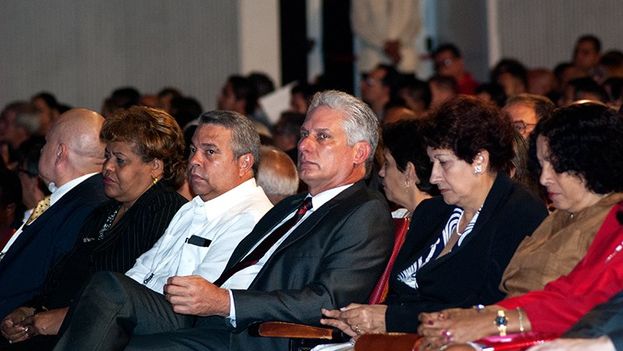
![]() 14ymedio, Carlos Alberto Montaner, 1 April 2018 — Raúl Castro leaves the presidency of the State Council to Miguel Díaz-Canel on Thursday April 19.
14ymedio, Carlos Alberto Montaner, 1 April 2018 — Raúl Castro leaves the presidency of the State Council to Miguel Díaz-Canel on Thursday April 19.
Officially, Cuba has a government appointed by the Parliament. Actually, the government is a family dictatorship, but the president is legally elected by a small leadership group (the State Council), seemingly segregated by the National Assembly of People’s Power (the Parliament), in which everything – supposedly – is carefully prearranged. Some opposition groups tried to nominate a few candidates, but it was impossible. Not even one was allowed. You do not play with tyranny.
Díaz-Canel (D-C) is a 57-year old electronics engineer and becomes president thanks to the recommendations of José Ramón Machado Ventura, a doctor who for many years oversaw the Communist Party and enjoys Raúl Castro’s total confidence. In that far from artificial division between fidelistas (Fidel Castro’s followers) and raulistas (Raúl Castro’s followers), D-C is a raulista, selected, in the first place, by his characteristics: he is a discreet pragmatic apparatchik who does not like innovations, a trait well regarded by inquisitors of all times.
A few months ago, Cuban State Security circulated a supposedly leaked video, in which D-C recited a very conservative collectivist catechism, conceived for three purposes – to engage the heir with those reactionary positions, to reassure the small group of Stalinists around Raúl, and to downgrade Cuban society’s multiple expectations of reform, so that no one is excited about the change. The Leopard’s formula maintains its validity in Cuba – if we want things to stay as they are, things will have to change.
What does Raúl Castro intend to do with this non-change? He intends to make possible the inevitable arrival to power of a new generation, born after the triumph of the Revolution (D-C is a 57-year old “kid”), but with the condition that they don’t make substantial changes to the regime created by his brother Fidel and a handful of henchmen. Like all dictators, Raúl would like time to stop in the moment in which he and his brother won a place in history. Simultaneously, he tries to assure his family and his friends that fate will be benevolent with them when he is not there to guarantee it. After all, he will be 87 years old very soon.
Is all that possible? Of course not.
All the conditions are in place for a change of regime to occur. First, the feeling of failure is widespread. The system’s lack of productivity is overwhelming. None of the parameters of a minimum quality of life resists the slightest analysis: housing, electricity, transportation, food, drinking water, clothing. Cuba has regressed in almost all aspects of existence. Adding to those problems are the constant fear, the absence of rights and the unpleasant need to lie, a need all Cubans have in order to survive in a totalitarian society. Living in Cuba is not pleasant neither materially nor emotionally. That’s why young people dream of leaving the country.
When will the regime change begin? The first step is when D-C becomes president. Although he repeatedly swears that he will be loyal to the Castros’ legacy, and even if he believes he will, the administrative environment of the country and society as a whole would like a radical transformation as soon as possible. What does this transformation consist of? Essentially, it would free the nation’s productive forces, unleashing the hands of entrepreneurs so they are able to create and accumulate wealth, invest and be powerful, even if the superstition of egalitarianism ends up impoverished.
The idea of a central economic nucleus, managed by the state and administered by the military, with around 2,500 companies that generates foreign currency, lacks spontaneity, flexibility and is a sure path to the disaster that lies in the accounting records, as audits have demonstrated. The model of Castro’s “guidelines” does not work. The idea of a private self-employed sector dedicated to serving the state as a taxpayer and as an employer of supernumerary workers that pay taxes is foolish.
After 60 years of nonsense Cubans know that there is no substitute for the market, economic freedom and private property. They also know that, despite its imperfections, the only system which can guarantee the organized transmission of authority, and that can be purged and transformed without violence, is the state under the rule of law that emerged from the Enlightenment, either as a republic or as a parliamentary monarchy. That’s the only way, even if D-C is against it. That’s the way of history.
Note: Translation is from the Latin American Herald
______________________________
The 14ymedio team is committed to serious journalism that reflects the reality of deep Cuba. Thank you for joining us on this long road. We invite you to continue supporting us, but this time by becoming a member of 14ymedio. Together we can continue to transform journalism in Cuba.
